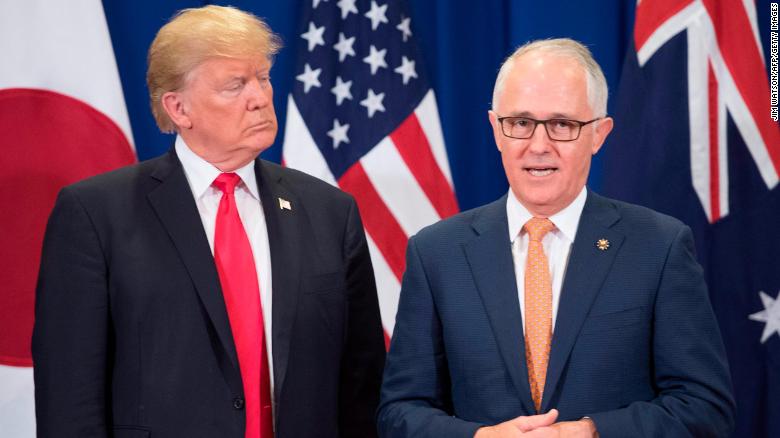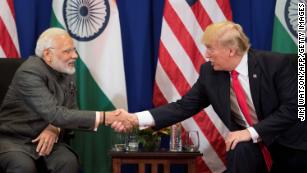So, as meetings go this week, Trump's Friday get-together with Turnbull should be one of his easiest. But on two issues in particular -- China and trade -- Trump might find his lunch mate from down under a bit of a tough sell.
By all accounts, it would appear both men have moved past the brouhaha last year when Trump complained bitterly to Turnbull about the deal President Obama struck in the waning days of his administration to permit the entry of more than 1,200 South Asian and Rohingya refugees that Australia had been harboring.
In a
testy telephone exchange, Trump called it a "disgusting deal" that embarrassed the United States and would cause him political problems at home.
"Where do they come from?" he roared about the refugees. "Are they going to become the Boston bomber in five years? Or two years? Who are these people?"
To its credit, the Trump administration has
resettled -- albeit quietly -- some of those refugees.
That little unpleasantness aside,
US-Australian relationscontinue apace, reinforced by robust military exchanges, sales and exercises; mutual support to increase pressure on North Korea; cooperation against ISIS in Iraq and against the Taliban in Afghanistan; and, of course, a united front against China's moves to militarize the South China Sea.
On the latter, Turnbull warned last June in a
speech at the annual Shangri-La Dialogue security conference that a "coercive China would find its neighbors resenting demands they cede their autonomy and strategic space and look to counterweight Beijing's power by bolstering alliances and partnerships between themselves and especially with the United States."
China differences
But in the main, Trump should expect to hear a more nuanced approach to China's rise than the one he himself espouses. China is
Australia's largest trading partner in both imports and exports. And, according to the Australian government, fully 25% of Australia's manufactured imports come from China and 13% of its exports are thermal coal to China. So, quite literally, Australia can ill afford to mismanage its approach to China's rise as both a military and economic power.
Neither can Trump, though. The US trade deficit with China climbed last year to
$375.2 billion, the highest level ever recorded. But while Trump's
National Security Strategy labels China "a strategic competitor using predatory economics to intimidate its neighbors," Australia's
2017 Foreign Policy White Paper takes a more nuanced view, welcoming "China's greater capacity to share responsibility for supporting regional and global security."
Just last month, after the release of Trump's National Security Strategy, Australian Foreign Minister Julie Bishop went to great pains to distance her government from the American view.
"We do not see Russia or China as posing a military threat to Australia," she told
reporters. "We undertake military exercises with China as well as other countries in the region and will continue to do so."
Trade imbalances
Turnbull will, no doubt, be interested in drawing the President out on just how far he is willing to go to adjust the trade imbalance with China. There's genuine concern in many corners that the administration seeks a trade war by imposing high tariffs on goods from China. Trump already slapped
tariffs on solar panels -- an industry dominated by China -- and his commerce secretary is weighing options to do the same on
steel and aluminum.
President Obama tried a similar tack in 2009, instituting a 35% tariff on Chinese tires after American companies complained about unfair competition. It saved more than a thousand US jobs in that industry but, according to a study by the
Peterson Institute for International Economics, dramatically raised the price of tires, costing Americans more than $1 billion, or roughly the equivalent of 3,700 retail jobs lost.
And we can expect the Chinese to retaliate with damaging tariffs of their own. They did it in 2009 (by imposing penalties on US shipments of chicken parts), and they will do it again. Of the pending Commerce Department decisions on steel and aluminum, Wang Hejun, China's chief of the Trade Remedy and Investigation Bureau, made clear that "if the final decision impacts China's interests, China will certainly take necessary measures to protect its own rights."
To be sure, the trade imbalance with China needs to be rectified, but it is difficult to see how anyone in the region, including Australia, stands to gain from a trade war between these two economic superpowers.
That's why it is highly probable the prime minister will want to revisit Trump's decision to pull out of the Trans-Pacific Partnership. In the wake of that decision, the TPP was reborn as the Comprehensive and Progressive Agreement for Trans-Pacific Partnership and now includes Australia, Brunei, Canada, Chile, Japan, Malaysia, Mexico, New Zealand, Peru, Singapore and Vietnam.
Without the powerhouse that is the US economy, this new multilateral arrangement, while important, will remain hobbled in its ability to act as an effective counterweight to China.
For his part, Trump should stand firm by his concerns over China's intentions in the region, concerns that are reflected in his decision to name Adm. Harry Harris, the current commander of the US Pacific Command and a China critic, to serve as ambassador to Australia.
He should reiterate the assessment of his national security team that the militaristic manner in which China is rising today threatens regional stability and warrants a return to the development of robust deterrent and conventional US military capabilities.
North Korea figures prominently here as well, given the accelerated pace at which the Kim Jong Un regime continues to develop its nuclear and ballistic missile programs and the anemic nature with which China uses its considerable influence on the regime.
Under President Obama, the US military shifted a considerable amount of resources into the Pacific region to specifically address these threats, including a contingent of Marines in Australia. Those were sound decisions then and are even more sound today. And Trump has ably reinforced them.
Of course, Australians do not need to be reminded of the increased threat. They live it every day. They know they benefit greatly from a robust American military presence nearby (though, in the wake of Trump's continued assault on the intelligence community and the dysfunction in his White House over security clearances, one could forgive the Aussies for a smattering of wariness over the depth of their intelligence sharing with the United States).
In any event, Trump should make no apologies for the more hawkish tone his administration has been taking, particularly against China.
On trade, one hopes Turnbull can persuade Trump to become more dovish -- to enter the CPTPP and to more carefully consider the dangers and damage a trade war with China might bring.
Trump told reporters at the World Economic Forum last month that he would be willing to reconsider TPP "if we were able to make a substantially better deal." But it's not clear what constitutes a better deal in Trump's mind. Perhaps Turnbull can extract some of that context from our chief executive.
The meeting on Friday should be one of Trump's easiest. But that doesn't make it any less important for our alliance with Australia, our shared economies or the safety and stability of the Asia-Pacific region.





No comments:
Post a Comment